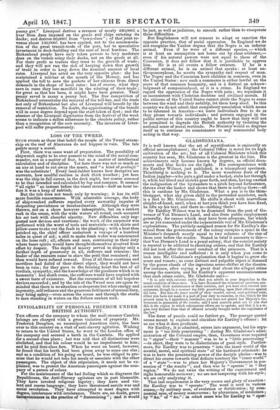LOSS OF THE TWEED.
Sum' events as those that befell the people of the Tweed steam- ship on the reef of Alacranes do not happen in vain. The tale points many a moral.
First, there was some want of preparation. The possibility of shipwreck ought to be ever present to the mind of the naval com- mander, not as a matter of fear, but as a matter of intellectual calculation and of discipline. Yet here there was not so much as an axe at hand to cut away the masts, and "a kind of penknife" was the substitute ! Every land-lubber knows how deceptive are currents, how needful caution in dark thick weather ; yet here was the ship in full career, in the dark night, her course assumed to be that intended and calculated by log and compass. It seemed 4' all right " an instant before the vessel struck—half an hour be- fore it was a heap of rubbish. But the tale does not teach only by warning; it has its still snore forcible reassurances. With admirable courage, the body of shipwrecked sufferers repelled every unworthy impulse of despairing peevishness or insubordination. Although they were thrown, not on a shore however inhospitable, but on a sunken rock in the ocean, with the wide waters all round, each accepted his set task with cheerful alacrity. New difficulties only sug- gested new devices and exertions : the work of the carpenter was performed with the worst of tools and materials—with shirts and pillow-cases to eke out the fault in the planking ; with a boat thus patched up, the chief officer undertook a voyage of a hundred miles in quest of aid ; a still to make fresh water was constructed on the loose raft ; all, officers and men, continuing in their duty where baser spirits would have thought themselves absolved from effort by despair. The depth of misery served to display only a further depth of generosity in all, sufferers and rescuers : the leader of the rescuers came to share the peril that remained ; and then would have refused reward. Even if all these exertions and sacrifices had failed of their direct object, they would not have been in vain; for they gave to the fainting heart the best of all cordials, sympathy, and the knowledge of the goodness which is in humanity : had death come, the sufferers would have expired with a sweet taste of existence. But the succession of all but hopeless devices succeeded ; and by the tale of the Tweed men are again re- minded that there is no situation so desperate but what energy and ingenuity, self-reliance and the generous fulfilment of mutual duty, may bring safety—even across the ocean and through the storm to men standing in waters on the forlorn sunken rock.


























 Previous page
Previous page